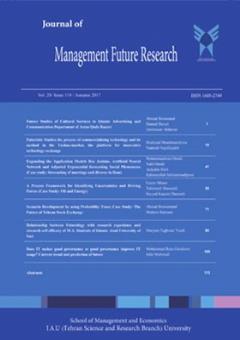Modeling Employee Bootlegging Behavior Form and it’s Effect on Improving Management Performance with the Intermediate Role of Organizational Knowledge Management (Case Study: Saipa Company)
Subject Areas : Futurologyemamali saaty garemusa 1 , Soleiman iranzadeh 2 , Houshang Taghizadeh 3 , majid bagerzadeh khaje 4
1 - PhD student in Industrial Management, Tabriz Branch, Islamic Azad University, Tabriz, Iran
2 - Professor, Department of Industrial Management, Tabriz Branch, Islamic Azad University, Tabriz, Iran
3 - Department of Industrial Management, Tabriz branch, Islamic Azad University, Tabriz ,Iran
4 - Assistant Professor, Department of Industrial Management, Tabriz Branch, Islamic Azad University, Tabriz, Iran
Keywords: Bootlegging Behavior, Management Performance, Organizational Knowledge Management.,
Abstract :
The main purpose of this study was to present a model for the formation of employee bootlegging behavior and its effect on improving managerial performance with the mediating role of organizational knowledge management. In terms of method, this research is descriptive-survey and in terms of purpose is applied research and in terms of type is exploratory research. The statistical population is managers and experts of Saipa company a sample of 256 people were selected by simple random sampling and studied. Interviews and questionnaires were used to collect data. The results of the analysis showed that the factors affecting the formation of employees' bootlegging behavior include individual factors (weakness in expressing ideas, incompatibility of ideas with work activity, low level of personal awareness, negative experiences, tendency to retain individual ideas, poor pragmatism, personality and introverted type). Lack of trust in managers and supervisors, fear of idea theft, low interest and motivation in the approach to progress, incompatibility of the idea with the needs of the organization, individual risk aversion) and organizational factors (organizational conservative culture, lack of access to resources, bureaucratic structure, supervision And organizational control, delegation of authority and independence of work, poor flow of information in the organization, organizational climate, lack of support of managers for new ideas, culture of individualism in the organization, weak reward system in the organization, lack of organizational teams, poor knowledge management in the organization, lack Technological and laboratory resources in the organization, organizational management style, low management skills and knowledge of the organization).


